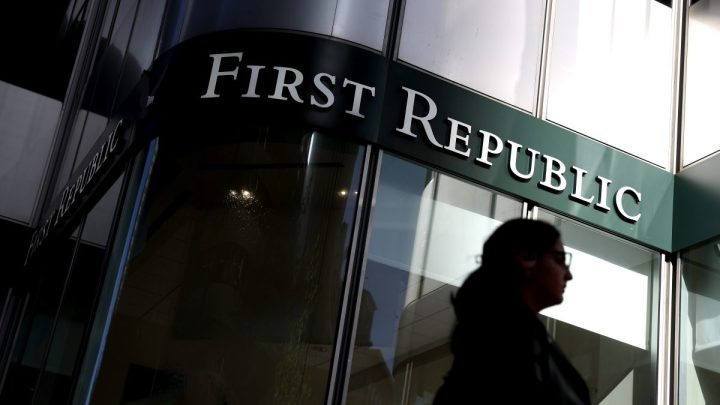
If you had to bet what will be the next shoe to drop in this banking situation people are finding themselves in, a good bet would be First Republic Bank. The San Francisco-based bank started the year with a stock price of about $123 a share. Then came the Silicon Valley Bank debacle, a depositor panic and … Friday?
First Republic closed at under $4 a share after trading was temporarily suspended.
The thing is, plenty of investors have made that bet about First Republic tanking. They’re called short sellers, and it’s not clear how helpful they are for stabilizing that “situation.”
Short sellers make money when they borrow a stock, sell it immediately, and then buy it back at a lower value. So, when stocks go down, they make money. For the past few months, short sellers have loved rooting against one particular type of company: regional banks.
“Shorts are up 36% in the whole sector, so basically, it was like shooting fish in a barrel. All these banks took a big drop in stock price,” said Ihor Dusaniwsky, who heads predictive analytics for S3 Partners, a data company that tracks this type of thing. He said short sellers really took aim at one very lucrative fish.
“First Republic shorts were up $1.2 billion — that’s billion with a B — so this was a fantastic trade for them,” he said.
Now, if you’re the Federal Deposit Insurance Corp. or the Federal Reserve, and your job is to prevent banks from failing, you may not like the idea of investors wagering that a bank is going to go down in flames, especially in a moment when people are kind of panicked about the financial system generally.
“They don’t really know which banks are good and which banks are bad,” said Xu Jiang, a professor at Duke University’s Fuqua School of Business. “So, that generates opportunities for short sellers to spread rumors.”
Jiang said that’s why the Securities and Exchange Commission temporarily banned short selling of financial stocks during the 2008 financial crisis. But prohibiting short selling for bank stocks could be counterproductive, said finance professor Chester Spatt at Carnegie Mellon University.
“Suppose what we did was we banned short sales last Monday. What do we think would have happened then? The ban would have immediately triggered a run,” he said.
Depositors might deduce that the state of the banking industry is pretty bad if the government is stopping people from betting that First Republic might fail, and they would withdraw whatever is left of their deposits.
There’s a lot happening in the world. Through it all, Marketplace is here for you.
You rely on Marketplace to break down the world’s events and tell you how it affects you in a fact-based, approachable way. We rely on your financial support to keep making that possible.
Your donation today powers the independent journalism that you rely on. For just $5/month, you can help sustain Marketplace so we can keep reporting on the things that matter to you.












